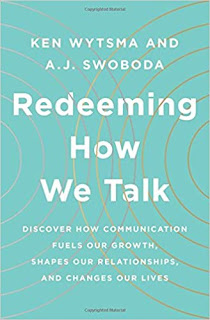AUTHOR: Ken Wytsma and A.J. Swoboda
PUBLISHER:Chicago, IL: Moody Publishers, 2018, (224 pages).
We have lots of ways to communicate and to build bridges with one another. With the advancement of science and technology, we are spoiled with regard to the means of communication. We can choose long distance video conferencing, social media interactions, mobile telephony, emails, and face to face meetings. Unfortunately, for all the scientific advancements, there is something else that has not kept up: Progression of human graciousness. Impatient replies could result in quick tempered reactions. Mass distribution of highly charged opinions could lead to social unrest. With many demanding to be understood rather than to understand, people hurl accusations based on a limited perspective. As a result, relationships break down. Walls are strengthened. Bridges are torn apart. There must be a better way. Instead of rejection and abandonment, we need to redeem how we communicate. We need to arrest the decline in good old conversations and work on constructive words and redeem how we talk. This is the key point in the entire book. Some of the highlights in the book include:
- Learning the nature, purpose, and practicing godly speech;
- Recognize what technology is doing to the way we communicate
- Practice the art of silence, loving listening, and tough talk
- Believing that we can redeem our talk.
Talk may be cheap but the consequences of bad talk could be devastatingly costly. Politically, many supporters of opposing parties tend to talk at instead of with one another. Propaganda has less to do with truth and more to do with the swaying of opinions toward one side. This leads to mistrust and "confirmation bias." Such methods are not restricted to the political powers of the day. Even commercial enterprises are doing that with their forms of advertising. Social media algorithms favour personalization that give people what they want to hear, more than what they need to hear. As technology becomes too fast for people to maintain conversational sanity, many are increasingly proposing for a technology fast. They are campaigning for a conversational break. This is particularly important as society becomes increasingly disembodied by the use of digital devices. For instance, more prefer to text than to talk, even though text reduces the contextual understanding. Enabling distant communications does not necessarily bring people closer together. It might drive them further apart. The authors also compare the effects of good media effects with bad media. They highlight the risk of information overload. In a post-truth era, relativism allows everyone to hang on to their own opinions and justify their self-righteous words and behaviour. We need to address language because our relationships depend on it. We need to redeem relationships because we are called to be our brother's keeper. For redemption is the language of love.
Wytsma and Swoboda then go back to the Bible to demonstrate that we need biblical wisdom in order to redeem our words and to cultivate fruitful conversations. This means paying attention to how Jesus speaks. Most poignant of all is how Jesus' words and His life are congruent. We not only need to learn when and how to talk, we need to know when and how NOT to talk. Silence when used appropriately could be hugely redemptive. Quoting the late Eugene Peterson:
"If we talk all the time, or let others talk all the time, our ears and mouths are filled with cliches and platitudes, mindless chatter and pretentious gibberish. In silence, language is renewed. In the absence of human sound it becomes possible to hear the logos, the word of God that gives shape and meaning to our words."
I loved that. From the Bible, we also learn about godly speech, to learn not only to control our tongues but to build others up with gracious words. We read about the importance of being at peace with God if we want to be peacemakers. We need the spiritual disciplines to calibrate ourselves with God. In other words, we cannot depend on ourselves in the practice of redemptive talk. Even when we could initiate conversations on our own strength, we need God to help us sustain that. As we work toward educating ourselves in the sacred curriculum of godly speech and constructive speaking, we will learn the basics of what it means to be human, and what it means to be a peacemaker.
We need more books like this. Like many relational matters, communication is both a science and an art. While the former progresses exponentially, the art has not kept up. Perhaps, with this book, we can redeem both of them at the speed of our respective relationships. People cannot be rushed just like many of us don't like others to rush us. Redeem our words with play, with prayer, and with praise; that we may be a blessing to others wherever we go.
Ken Wytsma is president of Kilns College where he teaches philosophy and justice. He is also the founder of The Justice Conference and the lead pastor of the Village Church in Beaverton, Oregon. AJ Swoboda is pastor at Theophilus Church in Portland, Oregon.
Rating: 4.75 stars of 5.
conrade
This book has been provided courtesy of Moody Publishers without requiring a positive review. All opinions offered above are mine unless otherwise stated or implied.

No comments:
Post a Comment